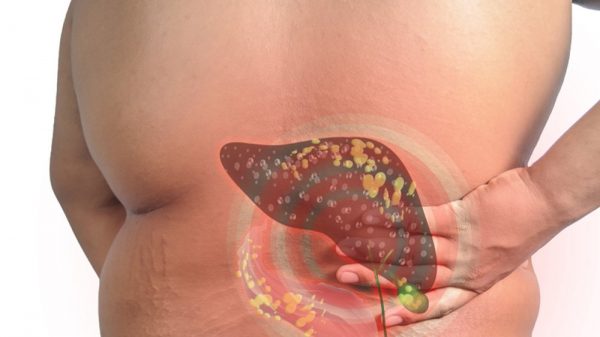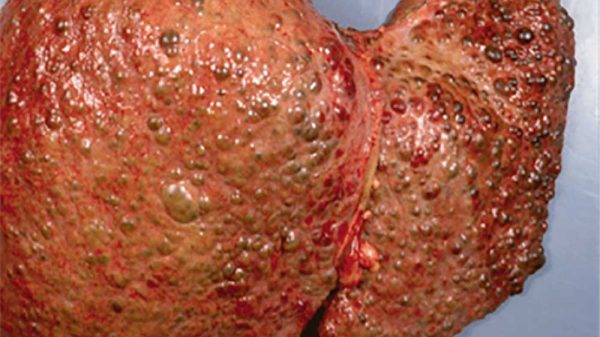Alcoholic cirrhosis of liver with ascites, what is it?
Alcoholic cirrhosis occurs after several years of drinking a lot of alcohol and it is a highly developed type of alcohol-caused liver disease. For those who have alcoholic cirrhosis, the likelihood is that your particular liver will not be functioning well for quite some time. In addition, you may possibly have had: steatosis, an ailment brought on by abnormal amounts of fats found in your liver.
Alcoholic cirrhosis causes the liver to be stiff, swollen, as well as barely able to perform its work. Alcoholic cirrhosis in the past been regarded as an irreparable outcome soon after extreme and extended liver damage. Alcohol consumption heavily for several years leads to alcoholic cirrhosis. The greater amount of alcohol which you continuously consume, the faster you may possibly develop cirrhosis. Specialists say the possibility of liver cirrhosis goes up in men when they drink at the very least 3 to 5 drinks a day for ten years. The chance towards liver cirrhosis raises for females when they drink at the very least two standard drinks a day. Nonetheless, studies concerning patients having liver disease caused by many distinct factors have indicated that cirrhosis and fibrosis may have an element of reversibility. Among patients having decompensated alcoholic cirrhosis who undergo transplantation, success is similar to patients having other reasons for liver disease alongside a five-year survival of around 70%. Keep reading to learn more about alcoholic cirrhosis of liver with ascites as well as the diet and treatment plans.
Alcoholic Cirrhosis of Liver with Ascites
The longer an individual drinks alcohol continuously, the much less alcohol is necessary to develop cirrhosis. As an example, an individual may progress cirrhosis when he/she averages 6 drinks a day for 8 years and even more following averaging 2 drinks a day for fifteen years. A lot of people try not to drink plenty of alcohol to build up cirrhosis as a result of drinking. Those who are dependent on alcohol and do not get treatment have reached an elevated danger for acquiring liver cirrhosis since they are struggling to control exactly how much they drink. Alcohol dependency rehab is really important to assist alcoholics to give up drinking preceding serious liver problems from evolving.
Heavy drinkers as well as alcoholics have reached the greatest risk with regard to liver cirrhosis, while a few individuals who drink to a great extent never progress with cirrhosis. Alcoholic cirrhosis produces several extreme symptoms that will require immediate medical help. The first stage of liver cirrhosis may well not influence noticeable symptoms. Given that disease becomes more serious, symptoms become worse. Doctors genuinely believe that genetic factors could possibly protect some individuals from cirrhosis.
Alcoholic cirrhosis Associated with the Liver: Signs and Symptoms
- Bruising easily
- Wasting muscle tone (atrophy)
- Weight loss
- Appetite loss
- Energy loss
- Jaundice (yellowing of eyes, skin)
- Bleeding inside he mouth
- Vomiting blood
- Patchy and red skin seen on palms (erythema)
- Confusion, poor concentration, memory loss, mental fog
- Swelling in th legs (edema), abdomen (ascites)
- Brown urine
- Fever
- Fluid buildup
Those that have some history of frequent alcohol intake then suffer from these symptoms must keep in touch with their own health care provider. A physician will diagnose liver cirrhosis with the help of imaging scan, blood examinations or biopsy, in accordance with the United States National Library of Medicine.
What is Ascites?
People who have liver cirrhosis or any other types of liver damage can experience negative effects involving malnutrition due to the fact that the liver struggles to process nutrition in foods or beverages. These individuals could also have difficulties taking medications which can be metabolized because of the liver.
A serious complication associated with alcoholic cirrhosis which causes fluid to produce within the abdomen is ascites. It is a warning indication concerning liver failure. Ascites may cause pain, difficulty breathing and also hernia. It may raise the threat of infection.
Further complications associated with liver cirrhosis comprise:
- Diabetes
- High blood
- Gallstones
- Kidney failure
- Liver cancer
- Hepatic encephalopathy (puzzled thinking and behavioral transformations)
- Variceal bleeding (a form of internal bleeding)
The treatment plan for liver cirrhosis normally starts with the therapy and the managing of complications.
Alcoholic Cirrhosis Treatments
Few treatment options are available concerning liver cirrhosis. A very important thing a person having liver cirrhosis may do is give up drinking. When you are used to taking in several drinks every day, you really need to speak to your doctor prior to cease drinking abruptly. It might be possible to undergo alcohol detox in the home, however it’s much safer to detox inside a rehabilitation facility in the event that you undergo withdrawal symptoms once you go a long time without alcohol.
Apart from sobriety, doctors can treat the signs of liver cirrhosis with:
Advanced treatments:
- Available at Stanford University, ELAD® (Extra Corporeal Liver Assist Systems) provides short-term dialysis in an attempt to restore liver function.
- Alcohol cessation: whenever you stop the use of alcohol the liver doesn’t have to focus as hard to accomplish its tasks.
- Regular assessment: Blood tests as well as imaging testing to observe how your liver responds to treatment. In fact, testing also allows us to catch the first signs and symptoms of complications, such as for instance, liver cancer.
Nutrition:
- Anti-inflammatories such as corticosteroids
- Pentoxifylline (prescription drug which improves circulation)
- Change in lifestyle: leading a healthy lifestyle often helps their liver heal while increasing the chances for an effective treatment. You may have to adjust old habits, that may include learning simple tips to eat a well-balanced diet. It would be ideal to seek the help of a dietitian who focuses primarily on working together with liver disease sufferers.
- Liver transplantation: In the event the condition will not improve along with treatment, you may possibly reach a place where the liver is not any longer able to perform its duty (this is liver failure). Once this occurs, you may need a liver transplant.
Now you have learned about alcoholic cirrhosis of liver with ascites condition and what to go about for diet and treatment options.























